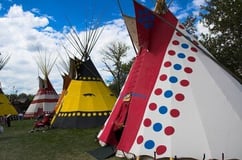
WACIPI WEEKEND SCHEDULE OF EVENTS
Welcome to Wakpa Ipaksan's Annual Wacipi!
We welcome you to our community we hope you have a memorable experience. Click on the buttons below to learn more about our weekend events. Have a safe and enjoyable weekend.
Location
The Wakpa Ipaksan Wacipi is held at our nation's Wacipi grounds located north of Flandreau South Dakota, on highway 13. The Dakota term Wakpa Ipaksan means a bend in the river and that is the exact location where our annual Wacipi is held, along the winding banks of the Big Sioux River.
Camping is available for participants, vendors and guests during our annual Wacipi. There are eight RV / Camper sites located on the north side of the river. These campgrounds are connected to our Wacipi grounds by our new foot bridge.
 The History of the Wacipi
The History of the Wacipi
Wacipi in the Dakota language means dancing, it is the plural form of the word Wa-ci to dance, also know as a pow wow to many. A Tiospaye, which means a band of people, traditionally a group of made up of closely related people, who would come together throughout the year to celebrated for various reason. These gatherings marked seasonal changes such as the one held after long winter and to give thanks to Wakan Tanka, the creator, for survival. Some gatherings were held after large game kills or seasonal harvests, while some were more spiritual in nature such as the Naming Ceremony or the ceremony held to honor the maturity of young men and women. At these gatherings, the people would invite friends and relatives from other Tiospayes to come celebrate, feast, sing and dance, while rekindling old friendships and forming new ones.
Modern Wacipi
Today, Wacipis are still very much a part of the Native American way of life. Some Wacipis begin as early as March, while most run from June until September and are held every weekend throughout the season. Many families pack up and “go on the circuit,” camping out and enjoying the traditional celebrations. although some traditional Wacipis are still held, the majority are competitive in nature; participants singing and dancing for prize money, while providing spectator entertainment.
